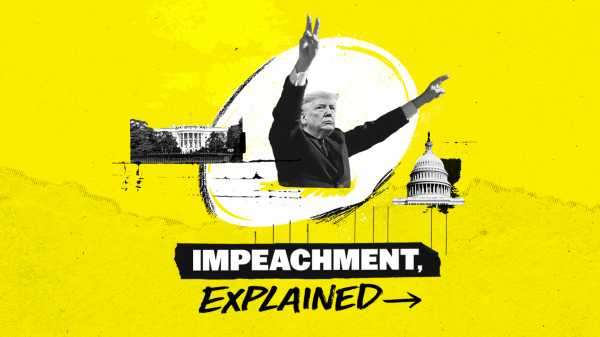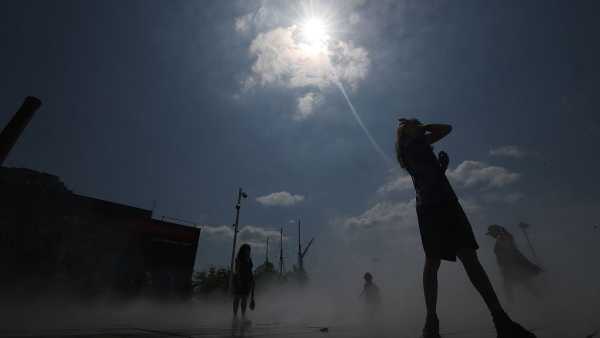
President Donald Trump has been working to defend himself against the ongoing impeachment inquiry by citing polling he says shows support for impeachment is on the decline. While some polling does in fact show a decrease in support for impeachment, it is not “dropping like a rock” as the president has claimed, nor have polls “turned very strongly against Impeachment.”
And it isn’t clear Trump is referencing numbers from any actual polls, like the data he cited Monday that he said shows support is “down into the 20’s in some Polls.”
In fact, polling suggests support for impeachment is holding fairly steady. It remains particularly strong among Democrats, with a mid-November Morning Consult poll finding 82 percent of Democrats supporting impeachment and a mid-November NPR/PBS Newshour/Marist poll finding 86 percent of Democrats in support. A FiveThirtyEight meta-analysis Monday finds an average of 80 percent of Democrats support impeachment.
Morning Consult’s findings are slightly down from early October, near the beginning of the impeachment inquiry, when its pollsters found 88 percent of Democrats supported impeachment. But they remain in line with polls taken ahead of the first public impeachment hearings, like an October 8 Quinnipiac University poll that found 85 percent of Democrats wanted to see Trump impeached and removed from the White House.
Similarly, polling among Republicans has not made any major shifts.
The November Morning Consult poll found 11 percent of Republicans supporting impeachment; the NPR/PBS/Marist poll saw 7 percent saying the same. FiveThirtyEight finds the average of pro-impeachment Republican sentiment to be around 12 percent. In early October, Morning Consult 12 found percent of Republicans supported impeachment, NPR/PBS/Marist 6 percent, and FiveThirtyEight found about 14 percent.
Overall, support seems to have slipped slightly; Morning Consult’s mid-November poll recorded it at 48 percent, NPR/PBS/Marist put it at 45 percent, and FiveThirtyEight’s analysis at 46 percent. Contrast this with the early October figures, when Morning Consult found 50 percent overall support for impeachment, NPR/PBS/Marist 49 percent, and FiveThirtyEight 48.8 percent.
Beyond slight declines in Democratic and Republican support, there has also been a decrease in support for impeachment among independent voters — something that the president has celebrated on Twitter, retweeting allies like Rep. Mark Meadows who have pointed out this trend.
Meadows cited a November poll from Emerson College that found 34 percent of independents in support of impeachment, down 14 percentage points from the level of support registered in the college’s October poll.
This poll is something of an outlier, however. Other polls have revealed shifts in support more in line with the changes recorded among Democratic and Republican voters: NPR/PBS/Marist found a 6 percentage point decrease (47 to 41 percent) from October to November and Morning Consult a 4 percentage point decrease (44 to 40 percent).
What none of these polls show is support for impeachment in the 20s, as Trump has claimed. It is possible that figure stems from a report from conservative firm Rasmussen — an organization’s whose polls have not always proved overly accurate, but that usually favor the president. A mid-November survey from that company found 18 percent of voters believe Trump will be impeached “before serving his full term in office.” This is not the number who support impeachment, but simply the number who think impeachment (and presumably removal from office) will happen.
It is also possible the president is simply misrepresenting available data, something he has done on Twitter before, most often when sharing his approval rating.
He said in September, for instance that polls showed his approval among Republicans was 94 percent; Saturday he claimed a 1 percentage point increase had been recorded and that his approval among Republicans is now at 95 percent. While his support among Republicans was high in September and is high now, it is not as high as the president has claimed.
Small reductions in support for impeachment don’t necessarily spell trouble for Democrats
While Trump’s reading of the polls does not appear to be accurate, it is fair to say that support is down slightly overall. In the weeks following House Speaker Nancy Pelosi’s announcement of an impeachment inquiry into Donald Trump, support for impeachment was on the rise across all political affiliations, suggesting Democrats were wise to begin the inquiry.
Recent trends are not necessarily cause for alarm among Democratic leaders, particularly as it remains to be seen whether recent downturns last or are fleeting. Support for impeachment has fluctuated before, and it is important to note available polling was conducted toward the beginning and middle of public impeachment inquiry hearings, not following them.
Your guide to the Donald Trump impeachment saga

Understand the impeachment process, from its history to what comes next. Explore the full guide here.
During those hearings, witnesses gave sworn testimony painting a picture of a campaign led by the president that subverted US foreign policy in Ukraine into a mechanism for domestic political gain, and many of the witnesses who arguably had a greater degree of insight into Trump’s role in the scandal, like US Ambassador to the EU Gordon Sondland, testified toward the end.
House Democrats certainly hope that those hearings will increase public support for impeachment, giving them a clear mandate to continue the process, and they still may, meaning recent polls — real or imaginary — are not really something for the president to celebrate.
Sourse: vox.com





